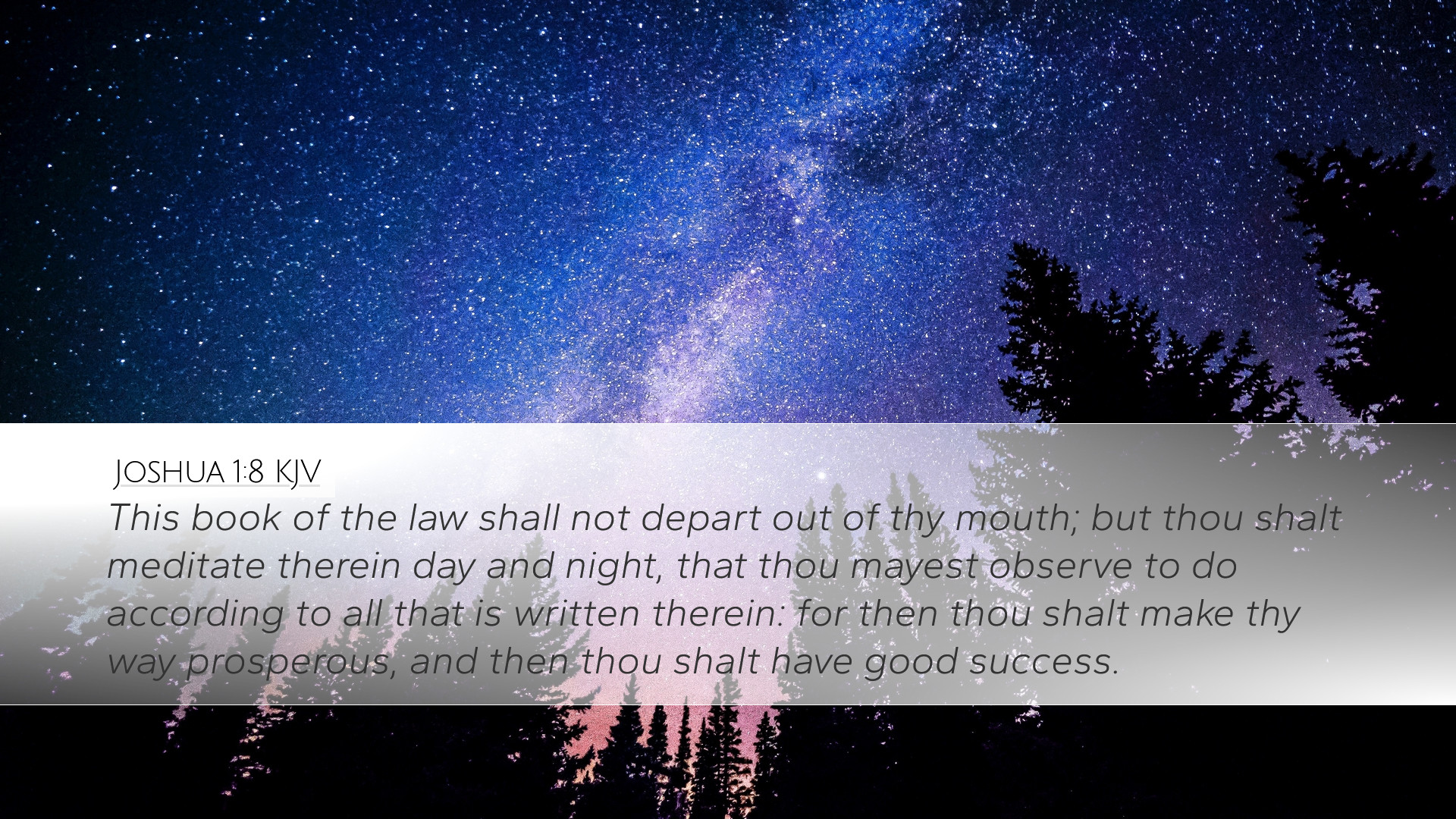Old Testament
Genesis Exodus Leviticus Numbers Deuteronomy Joshua Judges Ruth 1 Samuel 2 Samuel 1 Kings 2 Kings 1 Chronicles 2 Chronicles Ezra Nehemiah Esther Job Psalms Proverbs Ecclesiastes Song of Solomon Isaiah Jeremiah Lamentations Ezekiel Daniel Hosea Joel Amos Obadiah Jonah Micah Nahum Habakkuk Zephaniah Haggai Zechariah MalachiJoshua 1:8
Joshua 1:8 KJV
This book of the law shall not depart out of thy mouth; but thou shalt meditate therein day and night, that thou mayest observe to do according to all that is written therein: for then thou shalt make thy way prosperous, and then thou shalt have good success.
Joshua 1:8 Bible Commentary
Commentary on Joshua 1:8
Verse: Joshua 1:8 (KJV)
"This book of the law shall not depart out of thy mouth; but thou shalt meditate therein day and night, that thou mayest observe to do according to all that is written therein: for then thou shalt make thy way prosperous, and then thou shalt have good success."
Introduction
The exhortation in Joshua 1:8 serves as a foundational principle for the life of a believer and a leader. This verse encapsulates the importance of constant engagement with God's Word, indicating that prosperity and success hinge upon a deep and abiding relationship with Scripture. Insights from Matthew Henry, Albert Barnes, and Adam Clarke provide an enriching depth to this passage that can guide pastors, students, theologians, and scholars in their understanding and application of the text.
The Command to Meditate
Divine Instruction: Henry emphasizes that the command given to Joshua is not merely about reading the Law but meditating upon it. Meditation involves a reflective thinking process that deepens understanding and application. Joshua was instructed to speak of the Law frequently, indicating that it should be central to his thoughts and discussions.
The Continuous Process: Barnes draws attention to the phrase "day and night," emphasizing that meditation is not limited to occasional reflections but is to be a continual process. This highlights the necessity for believers to cultivate a habit of engaging with Scripture throughout their daily lives.
Observing and Doing
Actionable Knowledge: The latter portion of the verse underscores the ultimate purpose of meditation: to observe and do according to all that is written. Clarke notes that there is no true understanding of the Law without implementation. Knowledge gained through meditation must translate into action in order for it to be meaningful.
The Connection Between Knowledge and Success: Henry correlates obedience with success. This obedience, born from a heart that meditates on God's Word, leads to the fulfillment of divine promises. Success is not merely the absence of challenges, but the presence of God’s favor upon one's endeavors.
Implications of Prosperity
God's Definition of Prosperity: The term "prosperous" signifies more than material wealth. Clarke explains that true prosperity encompasses spiritual well-being, leading a life aligned with God's will and purpose. The emphasis is placed on a holistic understanding of success that involves all aspects of life—spiritual, mental, and physical.
Assurance in God's Presence: Barnes points out the assurance that comes from adherence to God's Word. The promise embedded in the command is that those who commit themselves to meditating on and obeying the law can expect divine guidance and blessings. This synergy between God's Word and success establishes a framework for living according to divine will.
Theological Reflections
Law as a Guide: The Law serves a dual purpose: it reflects God’s character and provides guidance for living righteously. Henry mentions that Joshua is called to not just follow the law but to internalize it, allowing it to shape his identity and leadership, which serves as a model for all who aspire to follow God's path.
Spiritual Discipline: The practice of meditation defined in this context is a form of spiritual discipline. Clarke emphasizes that consistent meditation fosters a relationship with God, reinforcing the notion that success in spiritual endeavors requires dedication and intentionality. For pastors and theologians, this serves as an essential reminder of the need for discipline in spiritual practices.
Application for Leaders
Preparing for Leadership: Just as Joshua is preparing for leadership, this passage instructs modern leaders to root their endeavors in the Scriptures. Barnes reflects on the importance of preparing one’s heart and mind before engaging with responsibilities, ensuring that decisions are informed by God’s truth.
Influence on Others: The diligence of a leader to meditate on God’s Word has a ripple effect on followers. Henry asserts that a leader who embodies the principles of Scripture not only cultivates their own success but also encourages others to align their lives with God’s decree, thereby fostering a community rooted in biblical truths.
Conclusion
Joshua 1:8 encapsulates the spiritual journey of engaging with Scripture, emphasizing meditation, obedience, and the promise of prosperity that aligns with God’s character and mission. As echoed in the insights of Henry, Barnes, and Clarke, this passage offers profound wisdom that transcends its historical context, encouraging all believers to approach God’s Word with diligence and reverence. For pastors, students, theologians, and Bible scholars, the call to meditate on the Scriptures is not just an admonition—it's an invitation to experience the fullness of life that God promises through His Word.


